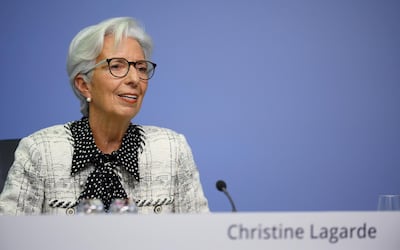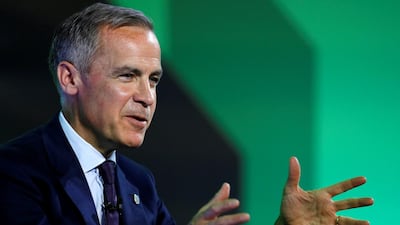Former Bank of England governor Mark Carney called on banks, insurers and fund managers to invest in private sector initiatives and profit from "the greatest commercial opportunity of our time" to help companies transition to a net zero future.
Mr Carney, a UN special envoy for climate action and an adviser to British Prime Minister Boris Johnson, told the three-day Green Horizon Summit that achieving net zero targets on greenhouse gases required “a whole economy transition, involving every company, bank, insurer and investors", who can now profit from "changing consumer preferences and new climate policies".
“Private finance will play a critical role in funding the initiatives and innovations of the private sector and helping companies realign their business models for net zero," he said.
"Our priority for Cop 26 is to build this market in the transition on the pillars of comprehensive climate reporting, better climate risk management, and optimisation of returns."
Mr Carney set out a private finance strategy ahead of Cop 26, the UN climate summit to be hosted by the UK which was set to start today in Glasgow. However, the event has been pushed back to November 2021 by the coronavirus pandemic.
Despite the delay, Mr Carney said the crisis has actually exposed the problem of “undervaluing resilience, ignoring systemic risk and not investing up front”.
“And so it is with climate change, a crisis that involves the entire world and from which no one will be able to self-isolate. Covid is forcing a social reset for countries and a strategic reset for companies,” he said. “Society is placing a greater value on resilience and on sustainability."
The former BoE governor’s advice came as the International Monetary Fund chief pointed to a long road to recovery for the world to bounce back from a 4.4 per cent shrinkage of the global economy.
IMF managing director Kristalina Georgieva revealed $12 trillion in fiscal measures to support jobs and said: “We are projecting a partial recovery next year but it will be a long ascent.
“Many countries will see long-lasting scars from this crisis and will not recover quickly.”
Warning against a focus on “near-term politics”, Ms Georgieva added: “We estimate financing of 2.3 per cent of GDP per year will be needed to meet the goals of the Paris agreement.
"But the right policies can pave the road towards net zero emissions in 2050," she said.
She also emphasised the need for immediate action. "This crisis has confronted us with a sudden social challenge.
“But it’s an opportunity not to be missed. To seize this opportunity, we must act. We must act now. There is no time to waste," Ms Georgieva said.
Mr Carney said 126 governments have committed to net zero including China, South Korea and Japan, with more and more countries recognising that green stimulus is essential.
Six years after the Paris convention, in which governments pledged to limit global temperature increases to below 2 degrees Celsius from pre-industrial levels, Cop 26 will see global leaders review their promises to cut carbon emissions and mobilise financial markets to support the transition to a net-zero world.
“Building a sustainable future will be capital intensive after a period when there's been too little investment. It will be job heavy, when unemployment is soaring,” Mr Carney said.
“Given the wholesale shift in economic and social drivers of value since Covid, it will be a rare company whose pre-crisis strategy remains optimal. And so businesses of all stripes increasingly recognise the changing consumer preferences and new climate policies are creating the greatest commercial opportunity of our time.”
Mr Carney said finance will be critical to accelerate a smooth transition by funding private-sector initiatives and amplifying the effectiveness of government climate policies.
A transition to net zero will affect how risk is measured and managed, and how assets are valued, he said, adding that climate change must now be assessed regularly by the accountants and auditors.
“We have governments setting the goal of net zero and we have over $140 trillion dollars of capital demanding action. At a minimum, companies must disclose whether the assumptions in their accounts are aligned with Paris. In other words, are they joining us on the road to Glasgow or not?” he said.
While almost half of companies with market capitalisation greater than $10 billion are disclosing in line with most of the Taskforce on Climate-Related Disclosures (TCFD) recommendations, Mr Carney called for full disclosure and urged governments to make climate-related disclosures mandatory.
Mr Carney pointed to the Network of Central Banks and Supervisors for Greening the Financial System (NGFS), the group of 75 central banks and supervisory authorities, which accounts for jurisdictions that account for two thirds of global emissions.
Fourteen of those organisations now issue guidance to major banks and insurers, after the NGFS published its set of scenarios for climate stress testing, which allows investors to compare results and readily differentiate the strategic resilience of companies they lend to.
“It's now developed standards for supervision and the management of climate risk, as well as approaches for climate stress testing, and central bank policies for climate change," he said.
With some of the world's largest banks, including Barclays, HSBC, and Morgan Stanley, committing to net zero by 2050, which means bringing all of their financed emissions in line with net zero, Mr Carney called on more firms to use these NGFS scenarios.

European Central Bank head Christine Lagarde told the summit that the financial system will be affected whether the transition to a carbon neutral economy takes place in an orderly fashion or otherwise.
“We should keep in mind that the consequences will be considerably worse if the transition is disorderly. And we should also keep in mind that finance can and must play a key role in fuelling and accelerating an orderly transition,” she said.
Ms Lagarde said financial institutions need to provide more complete disclosures of their climate exposures. And as a result, demand the same from the counter-parties.
"Financial markets need to play a substantial role in accelerating the development of new firms and new sources of sustainable growth by supporting innovation and financing it,” she said.

